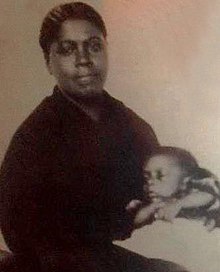| Henrietta Duterte | |
|---|---|
 | |
| Born | Henrietta Bowers July 1817 |
| Died | December 23, 1903(1903-12-23) (aged 86) |
| Resting place | Eden Cemetery (Collingdale, Pennsylvania) |
| Occupation(s) | funeral home owner, abolitionist |
| Known for | First American woman to own a mortuary |
| Relatives | Thomas Bowers (brother) John C. Bowers (brother) |
Henrietta Duterte (née Bowers; July 1817 – December 23, 1903) was an African-American funeral home owner, philanthropist, and abolitionist from Philadelphia, Pennsylvania. She was the first American woman to own a mortuary, and her business operated as a stop on the Underground Railroad.
Biography
Henrietta Bowers was born to an affluent, free black family and raised in Philadelphia on Middle Alley which is now called Panama Street, in Philadelphia's Society Hill. She was one of 13 children, including entrepreneur, organist, and abolitionist John C. Bowers, and Thomas Bowers, a renowned opera singer known as "The Colored Mario." Known for her fashionable attire, she began her career as a tailor. In 1852 she married Francis A. Duterte, a Haitian-American owner of an undertaking business. None of their children survived infancy and Francis Duterte died in 1858.
After her husband's death, Duterte took over the funeral parlor and became the first American woman to operate such a business. The funeral home earned a reputation for quick undertaking service, which was necessary for the time before modern-day embalming methods. The business was estimated to gross $8,000/year (about $211,500 as of 2017) under her ownership.
Duterte was a member of the Underground Railroad, and used her business to assist fugitive slaves from southern states seeking freedom in the North. She often hid runaway slaves in coffins or disguised them as part of funeral processions. In addition, the success of the funeral parlor allowed her to make generous contributions to her community, and she supported the AME Church of St. Thomas, the Philadelphia Home for Aged and Infirm Colored Persons, and the Freedman's Aid Society, which was created after the Civil War to assist formerly enslaved people in Tennessee.
Later in her life, Duterte transferred ownership of the funeral home to her nephew, Joseph Seth. Henrietta died at the age of 86 on December 23, 1903, and is interred at the historic Eden Cemetery in Collingdale, Pennsylvania.
References
- ^ Nielsen, Euell A. (28 April 2015). "Henrietta S. Bowers Duterte (1817-1903)". BlackPast.org. Retrieved 14 March 2024.
- ^ "Henrietta Duterte: Escape Through Death".
- Founders' week memorial volume: containing an account of the two hundred and twenty-fifth anniversary of the founding of the city of Philadelphia, and histories of its scientific institutions, medical colleges, hospitals, etc. Philadelphia. 1909. p. 743 – via Google Books.
{{cite book}}: CS1 maint: location missing publisher (link) - "Philadelphia Social History Project: Pennsylvania Abolition Society and Society of Friends Manuscript Census Schedules, 1838, 1847, 1856". www.icpsr.umich.edu. Retrieved 2023-05-30.
- ^ Submitted anonymously, University of Delaware (Spring 2016). King, Carolyne (ed.). "Henrietta S. Duterte". The Fight for Black Mobility: Traveling to Mid-Century Conventions. Colored Conventions Project: Bringing 19th-century Black Organizing to Digital Life. Retrieved 14 March 2024.
- Report of the Board of Women Managers for the Exhibit of the State of New York at the World's Columbian Exposition, 1893. J.J. Little & Company. 1893 – via Google Books.
- Jeffrey, Julie Roy (1998). The Great Silent Army of Abolitionism: Ordinary Women in the Antislavery Movement. p. 182 – via Google Books.
- 1817 births
- 1903 deaths
- 19th-century American businesspeople
- 19th-century American businesswomen
- 19th-century African-American women
- 20th-century African-American people
- 20th-century African-American women
- 19th-century American philanthropists
- 19th-century American women philanthropists
- 19th-century African-American businesspeople
- African-American abolitionists
- African Americans in Pennsylvania
- American funeral directors
- Burials at Eden Cemetery (Collingdale, Pennsylvania)
- Businesspeople from Philadelphia
- Philanthropists from Pennsylvania
- Underground Railroad in Pennsylvania